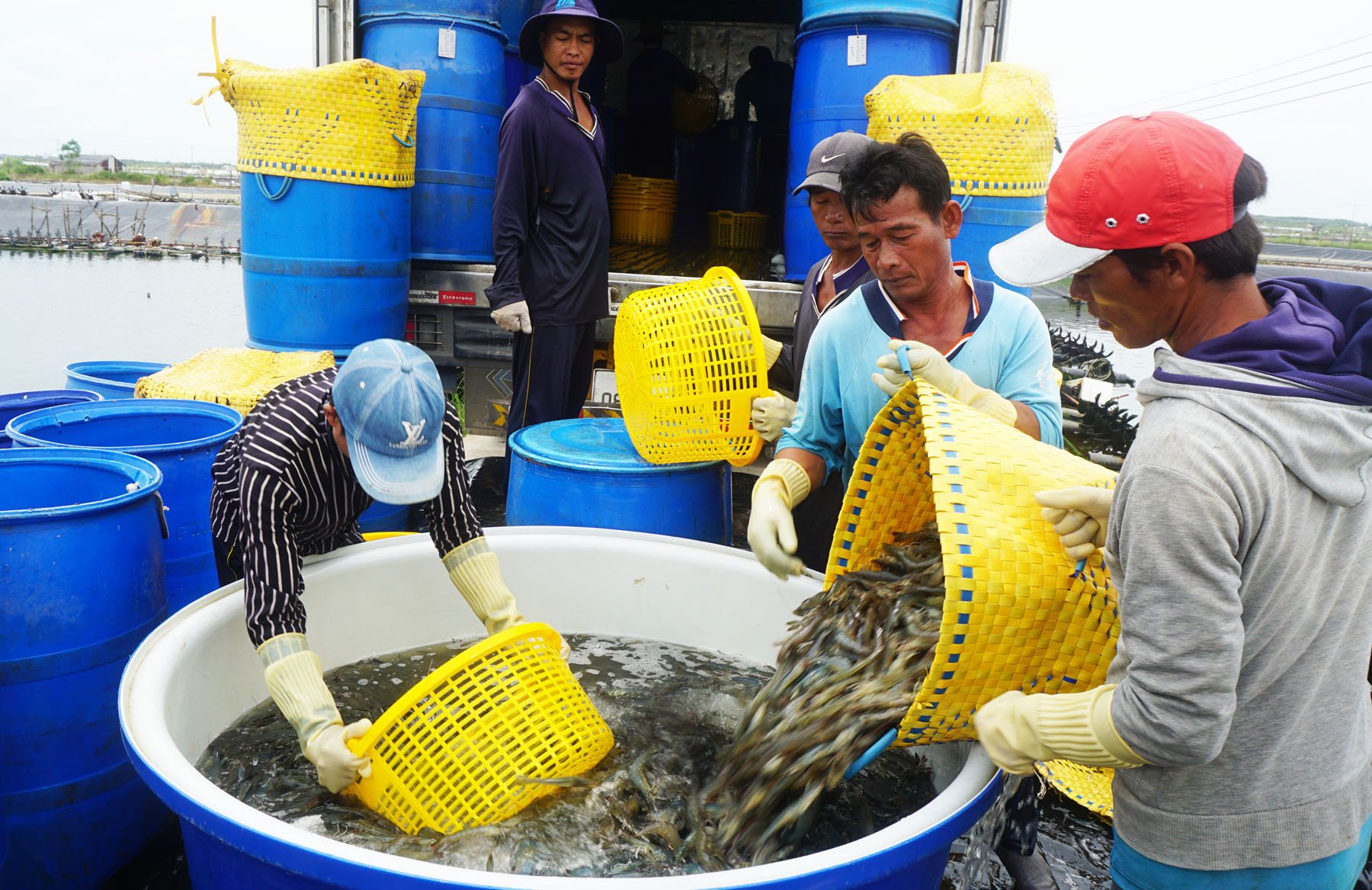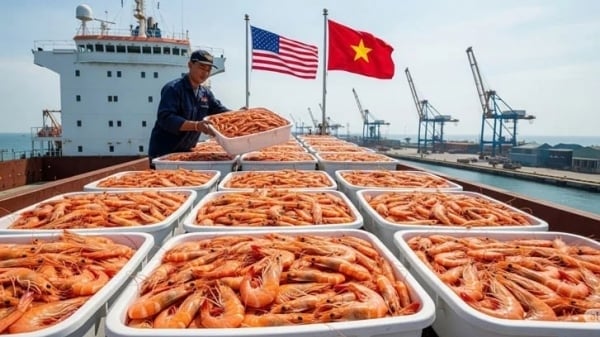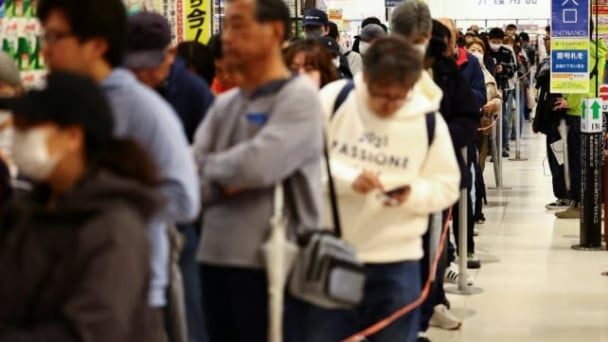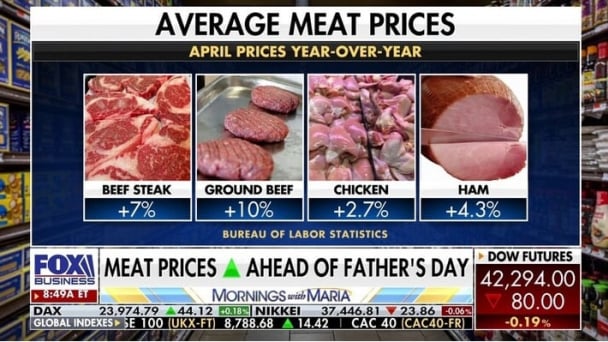June 15, 2025 | 06:34 GMT +7
June 15, 2025 | 06:34 GMT +7
Hotline: 0913.378.918
June 15, 2025 | 06:34 GMT +7
Hotline: 0913.378.918
Currently, the export of shrimp to key markets is showing promising signs of improvement, albeit slow but optimistic until the end of the year. According to the Vietnam Association of Seafood Exporters and Producers (VASEP), the market dynamics are positive as the inventory is being resolved. Exporting companies have started receiving contracts for shrimp exports serving the holiday season and year-end demand.

Harvesting shrimps in Soc Trang. Photo: Huu Duc.
In Soc Trang province, Mr. Ho Quoc Luc, Chairman of the Board of Directors of SAO TA Foods Joint Stock Company, which excels in both processing & exporting shrimp as well as applying advanced technology in shrimp farming, commented that although the world's consumption is gradually recovering, due to an excessive supply, the shrimp prices domestically have not yet improved and remain low. However, in the past half-month, shrimp prices have increased by an average of about 10,000 VND/kg (ranging from 7,000 VND/kg to 25,000 VND/kg) depending on the size.
Mr. Luc believes that there are still two concerns ahead. Objectively, inflation and economic recession persist, and the recovery point is unclear, while the global supply in the shrimp industry is still strong. Subjectively, Vietnamese shrimp prices are high, and there will likely be a shortage of raw shrimp for processing in the near future due to losses incurred by shrimp farmers, making it difficult for them to continue releasing juvenile shrimps for farming. The shortage of raw materials from now until the end of 2023 is the most concerning issue in the shrimp industry currently.
So how does one create a change in the current situation, where there are insufficient favorable conditions to gain an advantage and increase competitiveness, especially during the market recovery period. Mr. Luc analyzes that in business, to surpass the competition, one needs to have distinct and outstanding elements in the product. For Vietnamese shrimp, integration of convenience, taste, nutrition, and affordability is crucial. Vietnamese shrimp holds many strengths, except for the aspect of "PRICE." This is due to the low success rate in farming, coupled with the relatively high input costs for shrimp farming, leading to a higher production cost compared to the world prices. For example, the price of 50 pieces per kilogram of processed raw shrimp from Ecuador is 75,000 VND, while Vietnamese shrimp is 103,000 VND (as of August 4, 2023).
The market is always changing, and competition is inevitable. In the past decades, Vietnamese shrimp exports have achieved good growth rates. However, the development process has not always been as smooth. There were difficult times, such as in 2018 when shrimp exports declined. Before that, during the period from 2010 to 2015, there were challenges with the spread of EMS disease in shrimp farming areas. Nonetheless, this year faces unusual difficulties. The global inflation, economic recession, and decreasing demand are occurring while some shrimp farming countries like India and Ecuador are experiencing an increase in supply. In times like this, shrimp farming areas in Vietnam are facing signs of disease outbreaks, low success rates in farming and rising production costs.

Farmed shrimp products in the Mekong Delta. Photo: Huu Duc.
Many shrimp exporting companies acknowledge that Vietnamese shrimp farmers have been skilled in raising large-sized shrimp for many years. However, by the year 2023, the supply of large-sized shrimp from some other countries has also increased significantly. Among the six leading countries in shrimp farming and export, Vietnam has achieved the highest level of processing and holds a considerable market share in this segment. Naturally, competing countries in the same industry will continuously seek ways to improve their processing capabilities.
These unforeseen challenges require a comprehensive assessment of all factors involved in the supply chain to prevent a decline in the shrimp industry, which still possesses significant potential for recovery and development. Regarding this matter, shrimp exporting companies must continue to take the lead and find ways to further enhance their processing capabilities.
According to Mr. Luc, in order to proactively overcome difficulties and achieve sustainable development, a long-term perspective is essential. For instance, considering the implementation of sustainable development criteria to attract customers and align with global trends. A common example nowadays is the adoption of ESG criteria (Environmental – Social – Governance: a set of standards that measures a company's long-term and sustainable development practices), which emphasizes environmental protection and resource conservation, aiming for a Net-zero target by 2050, a commitment highlighted at COP26.
Translated by Nguyen Hai Long

(VAN) Noting risks, report examines impacts of avian influenza, changing trade patterns since 2022, fish fraud, and shipping industry’s net-zero goals.

(VAN) Mr. Tran Quang Bao, General Director of the Forestry and Forest Protection Department, met and worked with the International Wood Products Association to promote cooperation in the field of timber trade.

(VAN) China's outbound shipments of rare earths in May jumped 23% on the month to their highest in a year, though Beijing's export curbs on some of the critical minerals halted some overseas sales.

(VAN) To sustain capital flow, administrative reform alone is not enough; what farmers truly need is an ecosystem where both government and businesses grow together in support.

(VAN) Vietnam and the United States are proactively working together, each in their own way, to ensure that every container of agricultural goods carries not just products, but also long-term trust and value.

(VAN) Stores have started selling rice from the government’s stockpile to feed demand for the staple.

(VAN) Omaha Steaks CEO says rebuilding cattle herds will take about a year to ease price pressures.